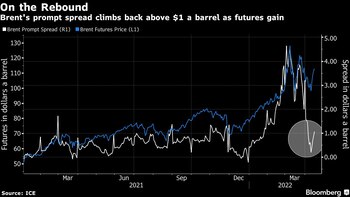
(Bloomberg) Oil rose with the closure of Libya's largest oil field in a market that is already undersupplied, obscuring signs that closures in China are affecting its economic growth.
Brent crude oil futures rose above US$113 per barrel for the first time since the end of March. The West Texas Intermediate was trading at around $108. Global markets face further disruptions in oil supplies after demonstrations against Libyan Prime Minister Abdul Hamid Dbeibé caused the closure of Sharara, the country's largest oil field. The protesters also forced the suspension of cargo work in two Libyan ports, while production stopped in the El Feel camp.
Previously, prices fell when Chinese economic data gave bearish news signals for the market. China reported the largest decline in consumer spending and the worst unemployment rate since the first months of the pandemic, adding another threat to global growth.
Oil has risen above US$100 this year, as the war in Ukraine has disrupted an already tight market, while some operators reject Russian crude. The increases prompted the United States and its allies to announce the release of millions of barrels from strategic reserves to ease inflationary pressures. However, global supply remains scarce, as OPEC and its partners refuse to increase the rate of return to production that was shut down during the pandemic.
Russian Deputy Prime Minister Alexander Novak said last week that if more countries banned the flow of Russian energy, prices could “significantly exceed” record highs. The US and the United Kingdom have taken steps to ban the entry of crude oil into the country following Moscow's invasion of Ukraine, and there is pressure for the European Union to do the same.
“The market is still getting used to the idea of how much Russian oil can be expelled from the market,” said Matt Stanley, Star Fuels operator and broker in Dubai. “That keeps Brent around US$110 per barrel.”
In a phone call over the weekend, Russian President Vladimir Putin and Saudi Crown Prince Mohammed bin Salman made a “positive assessment” of their efforts to stabilize the oil market, suggesting that a change in production policy is unlikely. The two nations lead the alliance that brings together the Organization of Petroleum Exporting Countries and its partners, known as OPEC+.
Oil markets remain in backwardation, a bullish pattern that reflects a shortage of supply. Brent's spread for next month, the difference between its two closest contracts, was more than $1.14 per barrel in backwardation, compared to 21 cents last week.
The increase in oil this year has been part of a broader advance in energy commodities that has seen gains spread even as the outlook for global economic growth shrinks. On Monday, US natural gas prices reached their highest level in more than 13 years as strong demand tests drillers' ability to increase supply.
Original Note:
Oil Gains as Libya Shuts Its Largest Oil Field Amid Protests
More stories like this are available on bloomberg.com
©2022 Bloomberg L.P.
Últimas Noticias
Debanhi Escobar: they secured the motel where she was found lifeless in a cistern
Members of the Specialized Prosecutor's Office in Nuevo León secured the Nueva Castilla Motel as part of the investigations into the case

The oldest person in the world died at the age of 119
Kane Tanaka lived in Japan. She was born six months earlier than George Orwell, the same year that the Wright brothers first flew, and Marie Curie became the first woman to win a Nobel Prize

Macabre find in CDMX: they left a body bagged and tied in a taxi
The body was left in the back seats of the car. It was covered with black bags and tied with industrial tape
The eagles of America will face Manchester City in a duel of legends. Here are the details
The top Mexican football champion will play a match with Pep Guardiola's squad in the Lone Star Cup

Why is it good to bring dogs out to know the world when they are puppies
A so-called protection against the spread of diseases threatens the integral development of dogs




